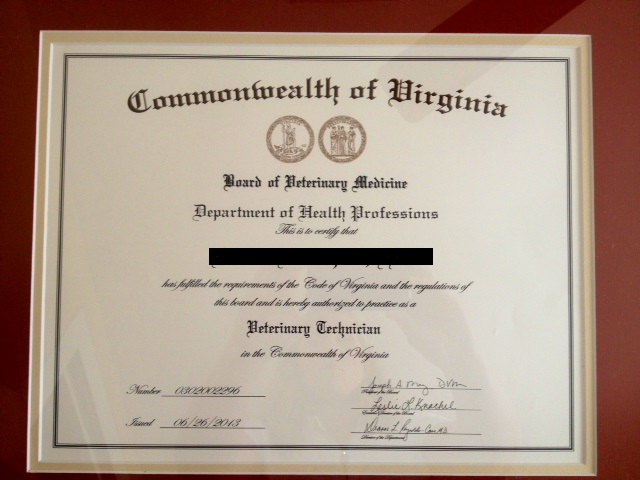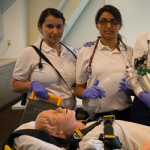What is a Veterinary Technician?
As a Veterinary Technician, your role in the office is crucial.
Most Veterinary Technicians spend time checking in patients and talking with owners to make sure all of their pet’s information is correct.
They will likely weigh the pets and help them into the exam room as well.
Once there, the Veterinary Technician will check the animals’ vitals and do any other procedures before the Veterinarian comes into the room.
As a Veterinary Technician, you’ll be allowed to do almost any task that a Veterinarian can do aside from surgeries and administering medications.
Duties
There are many tasks involved in the role of a Veterinary Technician.
Luckily, there are also some very cute animals to work with as well.
Some of the types of responsibilities that a Veterinary Technician must do in a day include:
- Perform diagnostic tests and x-rays
- Prepare animals for surgery
- Sanitize instruments
- Restrain animals
- Take all information down about the animal
- Assist with any research
- Educate animal owners
Salary
Most Veterinary Technicians in the United States will make about $36,850 a year.
This is average for those with qualified education and several years of experience.
If you are a Veterinary Technician who is just beginning your career, you should expect a salary closer to $28,370 to begin.
After many years of experience, certification, and specializations, a Veterinary Technician can make up to $48,100 a year or more in some areas.
Those who work in states with large populations like California or Texas will make more money, closer to the $77,000 mark than states like Idaho and Indiana.
Having credentials and hands-on experience in the field will also allow for higher salaries and promotions.
Annually National Average Salary: $51,280
Average Annual Salary by State
Annual Average Salary: Top 5 States
The top earning state in the field is , where the average salary is $0.
These are the top 5 earning states in the field:
* Employment conditions in your area may vary.
How to Become a Veterinary Technician
Step 1 Earn an Associates Degree
There are many important things to learn as a Veterinary Technician, and that is why most people who work in this position have an Associate’s degree from an accredited school.
It’s possible to find Veterinary Technician degrees online and on campuses at local community colleges and universities.
The average Associate’s degree should take around two years to finish.
Most programs that are accredited in the United States are Veterinary Technology programs.
These Veterinary Technology programs will consist of classes that include:
- Animal Care Skills
- Critical and Evaluative Reading
- Biology
- Chemistry
- Anatomy
- Large Animal Medicine
- Biochemical Research
- Veterinary Medicine
Once you graduate with at least a 2.5 GPA from a Veterinary Technology program, you will be eligible to take the certification exam.
Other aspects that may affect your program include externships, internships, and clinical lab work.
These can be requirements for graduation if your school offers them, and it’s most important to do those activities in person rather than online.
Step 2 Take the VTN Exam
Having a degree in Veterinary Technology is half the battle.
Now, you must take the Veterinary Technician National Exam.
In order to be eligible for the VTN exam, you will need to have graduated from an accredited program with at least a 2.5 GPA, or have required work experience as a Veterinary Technician.
The exam costs $330, and is a pass/fail test, which means you will not be scored on every question- you will only know if you passed or failed the exam.
There are several areas to study for on this exam, which may include topics like:
- Pharmacology
- Veterinary Medicine
- Medical Terminology
- Abbreviations
- Ethics and Principles
Not every state requires the VTN examination in order to become a Veterinary Technician, so check with your local board to find out if you need to become certified.
Even if your state doesn’t require it, certification can be a great way to set you apart from other Veterinary Technicians.
Step 3 Gain Experience
If you finished an Associate’s degree program that allowed for an externship or hands-on experience, you may be a step ahead of the game.
However, for those who are just entering the workforce, the experience is key to gaining recognition, promotions, and raises in this field.
Some of the areas in which you can find the experience as a Veterinary Technician include:
- Humane society
- Animal shelters
- Military
- Emergency and specialty practices
- Large veterinary clinics
- Small veterinary offices
Most Veterinary offices like to see Veterinary Technicians with at least two years of experience before allowing the employee to have more responsibilities.
It’s possible to volunteer and gain further education in order to maintain knowledge in this field as well.
Step 4 Maintain Certification
Lastly, to stay safe and legal in the world of Veterinary medicine, it may be necessary to keep your certification up to date.
Through the American Association of Veterinary State Boards, you can ensure that your Veterinary Technician certification and any other certifications available are properly accredited and authorized.
The Veterinary Technician certification from the AAVSB is required to be renewed every 3 years.
Most renewals require that you take the exam again or provide proof of further education.
There are several ways to gain further education as a Veterinary Technician.
Some of the most popular activities include:
- Webinars
- Online courses (sometimes for free!)
- Volunteering
- Conferences
- 4-H
Popular Programs
Education
Getting the proper education is essential in finding success as a Veterinary Technician.
Most Veterinary Technicians opt to earn an Associate’s degree, which can be done at community colleges and universities across the United States.
There are even programs that can be done online, but make sure that all internships and externships are done in-person to gain the proper knowledge.
All programs must be accredited through the American Association of Veterinary State Board, which is also the board that certifies Veterinary Technicians.
The average Associate’s degree program for Veterinary Technicians will have courses in math and science, as well as classes like:
- Chemistry
- Microbiology
- Anatomy and Physiology
- Veterinary Medicine
- Large Animal Care
- Small Animal Care
- Medical Terminology
- Psychology
- Patient Care
You should expect your Associate’s degree program to have an externship that is mandatory for graduation.
These types of experiences can provide hands-on opportunities to learn the tricks of the trade.
If you do not have one of these offered in your program, ask your local veterinary office if you can shadow them or volunteer.
Having an Associate’s degree will open many doors for you as a Veterinary Technician.
This type of degree can allow you to enter entry-level roles in the veterinary field.
In order to gain more responsibility and promotions as a Veterinary Technician, it is likely that you will need to earn a Bachelor’s degree.
These degrees can take anywhere from 2-4 years, depending on if you have an Associate’s degree already.
Once you gain a Bachelors degree, you can expect to have a career in areas like:
- Exotic medicine
- Emergency medicine
- Equine medicine
- Pharmaceutical sales
- Teaching programs
- Private business ownership
You must have an Associate’s degree in order to gain certification as a Veterinary Technician unless you already have two years of experience in the field.
Video About The Career
Certification and Licensing
Along with earning a solid education, you will need to take the Veterinary Technician Exam given by the American Association of Veterinary Technicians State Board.
In order to be eligible for this credential, you will need to have an Associate’s degree or two years of experience as a Veterinary Technician.
Passing the exam is essential to gaining this credential, and there are some important things to know before taking it.
There are only three chances to take the exam per year, and some of them are available online.
It costs around $330 to apply for this exam, which is about 200 questions
Once you are accepted, you will able to take the exam on your scheduled exam day.
The exam covers many topics, including areas like:
- Abbreviations
- Veterinary Terminology
- Patient Assessment Skills
- Radiography
- Ultrasounds
- Surgical Prep
- Anesthesia
There are some practice tests available on the AAVTSB website that cost around $45 and can help with studying for the exam.
After finishing the exam, you won’t know a specific score, just whether you passed or failed.
If you fail the exam, you will be eligible to retake the exam up to five times in one year.
Passing the exam means that you are a certified Veterinary Technician.
This credential is good for three years, after which you will need to retake the exam or show proof of further education.
The National Association of Veterinary Technicians in American has many resources for certifications.
Certifications for Veterinary Technicians are hard to find accredited programs, so this website will help to alleviate any worries.
Some of the types of specialty certifications that may be found on the NAVTA website are:
- Emergency and Critical Care
- Veterinary Dental Technician
- Veterinary Zoological Medicine
- Anesthesia
- Veterinary Behavior Technician
- Equine Veterinary Nursing
Each of these has its own requirements, and they can change at any time, so check out the NAVTA website for more information.
Certification Example:

Average Training Program Duration: 2-3 Years
The average program for Veterinary Technicians is around two years.
There may be some that you can find online that don’t take as long, but they may not be accredited.
These types of programs can hinder your career, as you could be working illegally.
However, with accredited programs, you can gain great knowledge and hands-on experience.
The typical Veterinary Technician program takes anywhere from 21 months to two years to complete.
Job Outlook
If you are looking to start a career as a Veterinary Technician, now would be a great time to get your foot in the door.
It seems that over the next ten years, the job opportunities for Veterinary Technicians will grow by around 15 percent.
The reason for the growth is that many more Americans are welcoming pets into their homes, and many more apartments and townhomes are allowing pets in their communities.
More pets mean more medical attention for them, which is great for Veterinary Technicians.
Advancements in technology have made some medical procedures easier to do as well, which can cause a rise in career opportunities.
Having a career as a Veterinary Technician will be most rewarding for those with an Associate’s degree and certification.
Employment Growth Projection: 15%
2020
2030
That's a higher than average projected growth of 17,100
Should You Become a Veterinary Technician?
Overall Satisfaction: Medium

Don’t just start working as a Veterinary Technician because you love animals, this career can be stressful throughout the day.
You’ll need to have thick skin and stamina to be a Veterinary Technician, especially because there is little upward mobility without education or certification.
Restraining animals and helping with procedures can make Veterinary Technicians anxious, so you’ll need to be able to handle stress and large animals at the same time.
The hours are good for those looking to have a well-balanced home/work life, but for those working in emergency veterinary care, the hours can be long.
If you plan to work as a Veterinarian one day, then starting a career as a Veterinary Technician should be on your list.
Average Salary: High

Having a career as a Veterinary Technician means that you could have a salary close to $36,850 in some areas.
Those who have a couple of years of experience, proper education, and credentials can expect to make closer to $48,100 a year as a Veterinary Technician.
If you think that you will start out making that much, you are mistaken, as the average newly hired Veterinary Technician will make about $28,370 a year.
Having certification and specializations in specific areas of veterinary medicine can also provide higher salaries and even promotions.
Job Growth Outlook: High

It seems that more people are getting pets over the last decade, and this trend will continue to grow for the foreseeable future.
Since there are so many new pets in households, that means the career opportunities for Veterinary Technicians will grow by around 15 percent.
That is quite a lot more than other careers in the medical field, but right on track for veterinary science.
Job prospects will be best for those with an Associate’s degree or higher, as well as any certifications or specialized credentials.
Education Duration: 2-3 Years

It’s important to understand veterinary medicine and animal anatomy before becoming a Veterinary Technician.
That is why most employers require at least a two-year Associates degree for their Veterinary Technicians.
This degree can offer entry-level education in Veterinary science and can lead to other careers in the same field.
For those looking to become Veterinarians, it’s possible to earn a Bachelor’s degree and then move up to a Master’s degree in this field.
A Bachelor’s degree can take another 2-4 years, and a Master’s degree can take up to two years.
Personal Skills Needed

It’s important to have a love for animals to work as a Veterinary Technician, but it’s also essential to have other skills as well.
Some of the types of skills that you should obtain before entering a career as a Veterinary Technician include:
- Communication skills
- Empathy for others
- Ability to see the fine details
- Physical stamina
- Medical terminology knowledge
- Technical skills
- Knowledge of computers
- Ability to handle stressful situations
- A love of learning
- A sense of urgency
- Leadership skills
- Ability to work as a team
Frequently Asked Questions
How much does a Veterinary Technician make?
On average, a Veterinary Technician makes about $36,850 a year.
With education and certification, many top-tier Veterinary Technicians make almost $80,000 a year in some areas.
Having hands-on experience and education is the key to this career.
Those who have little experience and education will typically start out making about $28,370 or less.
How long does it take to become a Veterinary Technician?
In order to gain the proper education, most Veterinary Technicians earn an Associate’s degree.
These degrees typically take anywhere from 21 months to 2 years to complete.
Most will require an externship or some sort of clinical lab work in order to graduate.
If you plan to explore careers beyond a Veterinary Technician, you may want to earn a Bachelor’s degree.
This type of degree takes around two to four years to finish.
What does a Veterinary Technician do?
There are many things that a Veterinary Technician will need to do throughout their workday.
Most of them involve animals and their owners.
A Veterinary Technician will often take the vitals of the animal and assess the animal for treatment.
It’s possible they will need to help hold the animal while the Veterinarian examines it as well.
Often, a Veterinary Technician will work on the computer to enter patient data and treatment information.
What is the demand for Veterinary Technicians?
More people are getting pets nowadays, which means that there will be an increased need for Veterinary Technicians over the next several years.
With an average growth of around 15 percent, this career will not be going anywhere anytime soon.
This is true for all careers in the veterinary medicine field.
Veterinary Technicians with certifications and experience will likely find the most job opportunities.
How much does it cost to become a Veterinary Technician?
In order to become a Veterinary Technician, you will need to earn at least an Associate’s degree.
Most often, an Associate’s degree in the United States is earned at a community college or university.
Depending on where you plan to gain your education, an Associate’s degree can cost anywhere from $10,000 to $15,000.
Those who earn a Bachelor’s degree can expect to pay over $35,000 in some areas.
 Veterinary Technician Info by State
Veterinary Technician Info by State

- Alabama
- Alaska
- Arizona
- Arkansas
- California
- Colorado
- Connecticut
- Delaware
- Florida
- Georgia
- Hawaii
- Idaho
- Illinois
- Indiana
- Iowa
- Kansas
- Kentucky
- Louisiana
- Maine
- Maryland
- Massachusetts
- Michigan
- Minnesota
- Mississippi
- Missouri
- Montana
- None
- Nevada
- New Hampshire
- New Jersey
- New Mexico
- New York
- North Carolina
- North Dakota
- Ohio
- Oklahoma
- Oregon
- Pennsylvania
- Rhode Island
- South Carolina
- South Dakota
- Tennessee
- Texas
- Utah
- Vermont
- Virginia
- Washington
- West Virginia
- Wisconsin
- Wyoming
Veterinary Technician Resources
- 16 Pros and Cons of Being a Veterinary Technician
- How Much Does It Cost to Become a Veterinary Technician?
- Online Vet Tech Training Programs
More Medical Careers
| Career | |
|---|---|
 | Dental Assistant Dental assistants help dentists to provide patient care, keep records, and care for the dental equipment. |
 | Dental Hygienist Dental hygienists take care of cleaning teeth to promote hygiene and help avoid cavities and gum problems. |
 | Dialysis Technician Dialysis technicians maintain and monitor dialysis equipment, and also act as primary caregivers for patients undergoing dialysis treatment. |
 | Dog Groomer Dog groomers attend to grooming dogs, usually at dog salons or big pet-related chain stores. |
 | Healthcare Administrator Healthcare administrators – also known as healthcare executives or health services managers – are responsible for the planning, direction, and coordination of medical and health services. |
 | Home Health Aide Home health aides provide home care to individuals who require assistance in their day-to-day living. |
 | Licensed Practical Nurse (LPN) Licensed Practical Nurses provide basic nursing care to patients and work with Registered Nurses and Doctors. |
 | Medical Assistant Medical assistants support the work of physicians, nurses, and other health professionals. |
 | Medical Biller and Coder Medical billers and coders manage, organize, and code various health information data. |
 | Medical Technologist Medical laboratory technologists collect bodily samples and conduct tests to analyze those samples. |
 | Medical Transcriptionist Medical transcriptionists go over voice recordings to convert them into written texts. |
 | Patient Access Representative The work involves helping people to orient themselves to the space and everything that is going on. |
 | Patient Care Technician Patient care techs work directly with patients helping them with daily activities and assist the medical staff by measuring and monitoring the patients' vital signs among other tasks. |
 | Pharmacy Technician Pharmacy technicians provide patients with medications through prescription or over the counter. |
 | Phlebotomist As a Phlebotomist, it will be your responsibility to take blood samples from patients and send them to the lab for further testing. |
 | Physical Therapist Assistant Physical therapist assistants provide physical therapy services to patients and aide to physical therapists. |
 | Professional Recovery Coach A professional recovery coach is a life coach who works with someone during their addiction recovery process. |
 | Radiation Therapist Allied health provisional who specializes in radiation oncology treatments. |
 | Registered Health Information Technician Registered Health Information Technician (RHIT) help store and verify accuracy of health records as well as analyze patient data. |
 | Registered Nurse (RN) Registered Nurses provide hands-on patient care in various settings, mainly hospitals, and clinics. |
 | Respiratory Therapist Respiratory therapists treat and care for patients who experience breathing difficulties. |
 | Sterile Processing Technician A sterile processing technician is a healthcare professional who is responsible for preparing, sterilizing, maintaining, packaging, and storing medical tools and equipment used in surgical and other medical procedures. |
 | Surgical Technologist Surgical technologists – also known as operating room techs – prepare operating rooms and assist doctors and nurses during surgical procedures. |
 | Veterinary Assistant Veterinary Assistants work closely with Veterinarians to handle routine animal care. |
 | EKG Technician EKG technicians test and monitor the cardiovascular system. |
 | EMT Trained emergency medical technician that arrives at the scene to provide medical services such as resuscitation. |
 | MRI Technologist MRI Technologists use a machine to scan the body and create a detailed image of the inside for doctors to analyze. |
 | Optician Opticians are technicians and salespersons at the same time who spends most of their day talking to customers, reading prescriptions written by doctors, and dispensing glasses and lenses. |
 | Ultrasound Technician Ultrasound technicians aid physicians in monitoring and diagnosing patients through the use of ultrasonic imaging technology. |
 | X-Ray Technician X-Ray Technicians are medical imaging professionals who use technology to visualize the inside of our bodies. |














